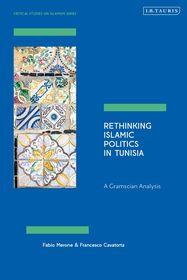
Rethinking Islamic Politics in Tunisia
A Gramscian Analysis
Series: Critical Studies on Islamism Series;
- Publisher's listprice GBP 85.00
-
40 608 Ft (38 675 Ft + 5% VAT)
The price is estimated because at the time of ordering we do not know what conversion rates will apply to HUF / product currency when the book arrives. In case HUF is weaker, the price increases slightly, in case HUF is stronger, the price goes lower slightly.
- Discount 13% (cc. 5 279 Ft off)
- Discounted price 35 330 Ft (33 647 Ft + 5% VAT)
Subcribe now and take benefit of a favourable price.
Subscribe
40 608 Ft

Availability
Not yet published.
Why don't you give exact delivery time?
Delivery time is estimated on our previous experiences. We give estimations only, because we order from outside Hungary, and the delivery time mainly depends on how quickly the publisher supplies the book. Faster or slower deliveries both happen, but we do our best to supply as quickly as possible.
Product details:
- Publisher Bloomsbury Publishing (UK)
- Date of Publication 27 November 2025
- Number of Volumes Hardback
- ISBN 9780755656387
- Binding Hardback
- No. of pages224 pages
- Size 234x156 mm
- Language English 700
Categories
Long description:
The emergence of Islamist and Salafi movements - the actors of Islamist Politics - has been a critical area of scholarship on the Middle East and North Africa. But there is no theoretical framework to understand political Islam as a phenomenon that includes both Islamic ideology and modern activism. This book uses the Gramscian concept of political activism to provide this much-needed perspective. As Arab societies have had a similar historical development and trajectory to the society Gramsci was analyzing, his ideas are shown to be particularly relevant for understanding the post-2011 democratization and politicization of Islamist and Salafi movements.
Based on the case study of the Tunisian Islamist movement, al-Nahda, and the Tunisian Salafi movement, Ansar al-Sharia, political Islam is given a useful explanatory framework to explain how the ideological/theological side of Islamic activism realizes itself into practical political action. The book establishes the term 'Islamic politics' to describe this combination of socio-religious mobilization - commonly defined as dawa - and political organization, including party or revolutionary organizations. Furthermore, the authors show that Islamists and Salafists can be described as 'post-Islamist' in the same way communist parties became 'post-communist' and 'post-ideological'.
Written by two renowned experts on political Islam, the innovative theoretical framework used here can explain the development and behaviour of Islamist groups in other contexts, moving scholarship beyond traditional approaches.
Table of Contents:
Introduction
Chapter 1: Islamic Politics: Islamism, Salafism and Post-Islamism
Chapter 2: Islamic Politics and Gramsci
Chapter 3: Islamic Reformism, Popular Mobilization and the Construction of a Modernist Ideology in Tunisia
Chapter 4: The 'Gramscian' Turn in Tunisian Islamic politics: al-Nahda
Chapter 5: The Second Wave of Islamic Politics: Ansar al-Sharia
Chapter 6: Al-Nahda and Post-Islamism
Chapter 7: The end of Islamic politics?
Conclusion
Bibliography
Index




